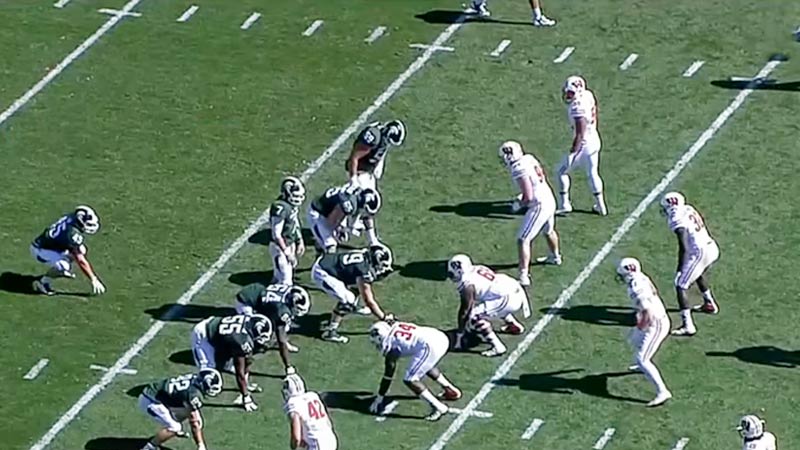Football, with its riveting plays and strategic prowess, captures the hearts of millions worldwide. However, amidst the thrill of the game, certain actions disrupt its equilibrium, often leading to penalties and raising questions about sportsmanship.
One such contentious aspect is the “Disconcerting Acts or Signals Penalty.” In this blog post, we delve into this intriguing facet of football, shedding light on what it entails, why it matters, and the impact it has on the game.
From mimicking snap counts to sowing confusion, disconcerting acts walk a fine line between tactical innovation and unsportsmanlike behavior.
What Is Football Disconcerting Acts or Signals Penalty?
A disconcerting signals penalty in football occurs when a defensive player imitates the offensive signals, specifically the quarterback’s cadence, with the intention of causing confusion among the offensive team.
This penalty is enforced by referees when they observe a defensive player mimicking the snap count or attempting to mimic false audibles, thereby aiming to disrupt the offense’s coordination and timing. Such actions are considered unsportsmanlike conduct as they undermine fair play and the integrity of the game.
The penalty serves to maintain a level playing field and uphold the principles of fair competition. It reflects the sport’s emphasis on strategic gameplay while discouraging deceptive tactics that could unfairly disadvantage the offense.
By penalizing disconcerting acts or signals, football ensures that teams compete on the basis of skill and strategy, promoting an environment of sportsmanship and integrity on the field.
When Do Disconcerting Acts Imply?
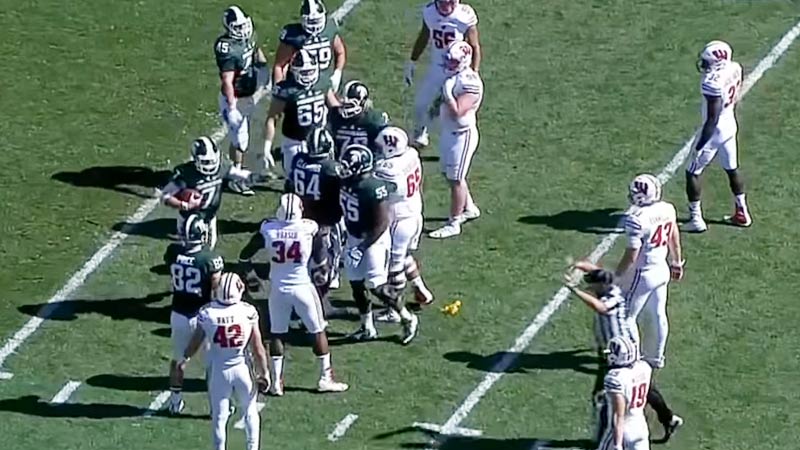
Disconcerting acts in football refer to actions taken by defensive players to deliberately confuse or disrupt the offensive team’s communication and coordination during a play.
These actions are aimed at capitalizing on the offense’s reliance on specific signals and audibles to execute their plays effectively.
The concept of disconcerting acts mainly comes into play during situations involving the quarterback’s cadence, snap count, and audible calls. Here’s an elaboration on when disconcerting acts might occur:
Snap Count Mimicry
Defensive players might attempt to mimic the quarterback’s snap count to anticipate the snap and get an advantage over the offensive linemen.
By using similar timing and rhythm in their vocalizations, they hope to induce the offensive line to a false start or disrupt their blocking assignments.
Audible Disruption
Quarterbacks often use audibles to change the play at the line of scrimmage based on the defensive alignment.
Defensive players could try to call out fake audibles or shout confusing signals to create uncertainty among the offensive players about the actual play call, leading to miscommunication and potential mistakes.
Pre-Snap Movements
Defensive players might engage in sudden and erratic movements or gestures just before the snap to distract the offensive line and skill players.
These movements can be designed to draw attention away from the snap count and intended play, causing hesitation and confusion.
Verbal Taunts
Some defensive players might engage in verbal taunts or trash talk aimed at disrupting the concentration of offensive players.
By creating a hostile or distracting atmosphere, they hope to undermine the focus and execution of the offensive play.
Shifts and Formations
Defensive players could suddenly shift positions or formations just before the snap to confuse the offensive line’s blocking assignments or disrupt the timing of the play.
These abrupt changes can lead to breakdowns in protection schemes and disrupt the intended play.
Use of Hand Signals
While defensive players are not privy to the offensive team’s specific hand signals, they might try to interpret and respond to those signals if they can decipher them.
This could lead to defensive players anticipating plays or movements based on their interpretation of the signals.
Disconcerting acts are penalized because they go against the spirit of fair play and sportsmanship. The penalty discourages such tactics, ensuring that the game is played on a level field where both teams have a legitimate opportunity to execute their plays without unnecessary interference.
Consequences of Disconcerting Acts
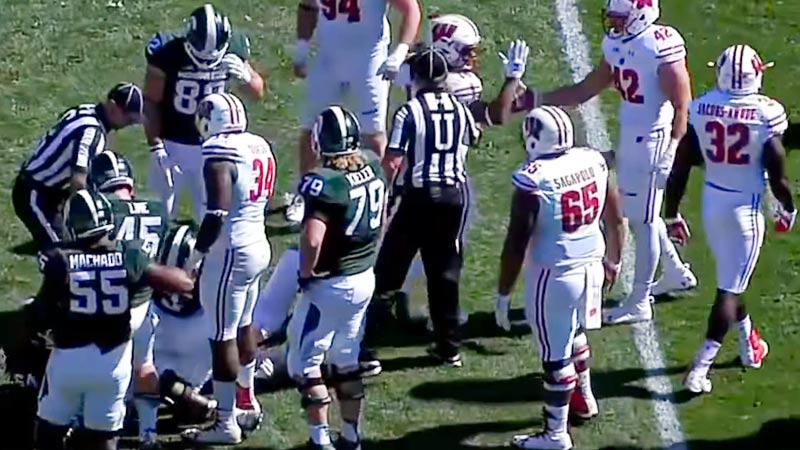
Engaging in disconcerting acts in football can have various consequences, both for the offending player and their team, as well as for the overall integrity of the game. Here are some of the potential consequences of disconcerting acts:
Penalties
Disconcerting acts are typically penalized as unsportsmanlike conduct. The consequences can include a 15-yard penalty assessed against the offending team. This penalty can have a significant impact on field position and potentially lead to automatic first downs for the offense.
Loss of Focus
Engaging in disconcerting acts can lead to a loss of focus and concentration for the offensive players. This disruption can result in miscommunication, missed assignments, and mistakes that hinder the execution of plays.
False Starts
Mimicking snap counts or using other disconcerting tactics can cause offensive linemen to a false start, moving before the ball is snapped. This results in a five-yard penalty against the offense, making it more difficult for them to advance down the field.
Communication Breakdowns
Disconcerting acts can lead to communication breakdowns among offensive players, particularly the quarterback and the rest of the team. This can result in misreads, improper route running, and missed opportunities for successful plays.
Strategic Disruption
The purpose of disconcerting acts is to disrupt the opponent’s strategy and timing. Successful use of these tactics can lead to confusion, hesitation, and an inability to execute plays as intended.
Team Reputation
Repeated or flagrant use of disconcerting acts by a team or its players can harm their reputation and sportsmanship. It may lead to negative perceptions from fans, opponents, and even potential future teammates.
Referees’ Attention
Engaging in disconcerting acts can draw the attention of referees, making them more watchful of a team’s behavior. This heightened scrutiny can result in more penalties being called against the team, impacting their overall performance.
Game Control
The use of disconcerting acts can influence the overall control of the game. It can slow down the pace, create confusion, and disrupt the flow of the match, affecting both teams’ ability to execute their game plans effectively.
Countermeasures
Offenses may develop countermeasures to counteract disconcerting acts, such as implementing silent snap counts, using hand signals, or employing other non-verbal communication methods. These adjustments can impact the offensive playbook and disrupt the team’s original strategy.
Fan Reactions
Fans and spectators might react negatively to disconcerting acts, viewing them as unsportsmanlike conduct and potentially impacting the perception of the sport as a whole.
The consequences of disconcerting acts go beyond just the immediate penalties. They can disrupt the flow of the game, impact the performance and reputation of the teams involved, and influence the overall dynamics of the match.
As a result, there is an emphasis on fair play, sportsmanship, and maintaining the integrity of the game in football.
Penalties That Are Similar to Disconcerting Acts or Signals Penalty
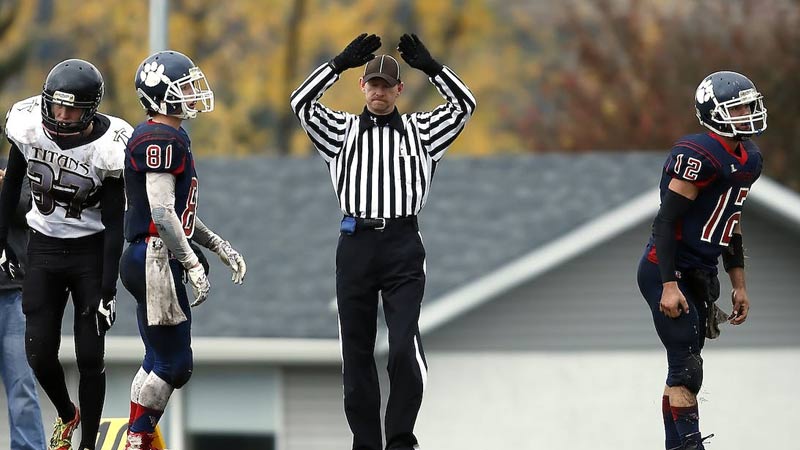
Several penalties in football share similarities with the disconcerting acts or signals penalty, as they all pertain to unsportsmanlike conduct, disrupting the game’s fairness, or attempting to gain an unfair advantage through deceptive or manipulative tactics.
Here are some penalties that align with the spirit of the disconcerting act’s penalty:
Neutral Zone Infraction/Offside
Similar to mimicking snap counts, a defensive player who enters the neutral zone before the snap can cause offensive linemen to a false start. This penalty results in a five-yard penalty against the defense.
Taunting/Unsportsmanlike Conduct
Just as disconcerting acts can involve verbal taunts to disrupt opponents, taunting penalties occur when players engage in excessive celebration, taunting, or disrespectful behavior towards opponents, leading to yardage penalties.
Delay of Game
While this primarily affects the offense, it can be viewed as a counterpart to disconcerting acts. Deliberate actions by the defense to delay the snap or confuse the offense can result in a delay of the game penalty.
Roughing the Passer
Engaging in roughing the passer can also be considered a form of disrupting the quarterback’s rhythm and timing. Such penalties result from unnecessary or late hits on the quarterback after the ball has been thrown.
Illegal Substitution
Intentionally trying to confuse the offense by making last-minute substitutions or presenting a misleading defensive formation can lead to an illegal substitution penalty.
Illegal Shift/Formation
Similar to shifting forms of disconcerting acts, illegal shifts or formations occur when offensive players move prior to the snap, trying to confuse the defense or gain an advantage. This results in a penalty against the offense.
Face Mask/Unnecessary Roughness
While not directly related to mimicking signals, such penalties involve aggressive actions that can disrupt the flow of the game and potentially injure players.
Pass Interference
Although not deceptive, pass interference penalties can disrupt the intended passing play by impeding the receiver’s ability to make a catch. It falls under the category of unsportsmanlike behavior that interferes with fair competition.
Clipping/Illegal Block Below the Waist
These penalties involve low blocks that can disrupt players’ positioning and potentially lead to injuries, similar to how disconcerting acts aim to disrupt opponents’ effectiveness.
Ineligible Receiver Downfield
Deliberate manipulation of eligibility by offensive linemen, who report as eligible receivers downfield, or ineligible players attempting to catch passes can lead to this penalty, creating confusion for the defense.
All these penalties share the theme of unsportsmanlike conduct, intentional disruption, or seeking unfair advantage through various means.
Football rules and penalties are designed to uphold the integrity of the game, ensuring fair competition and a level playing field for both teams.
Advantages of Disconcerting Acts
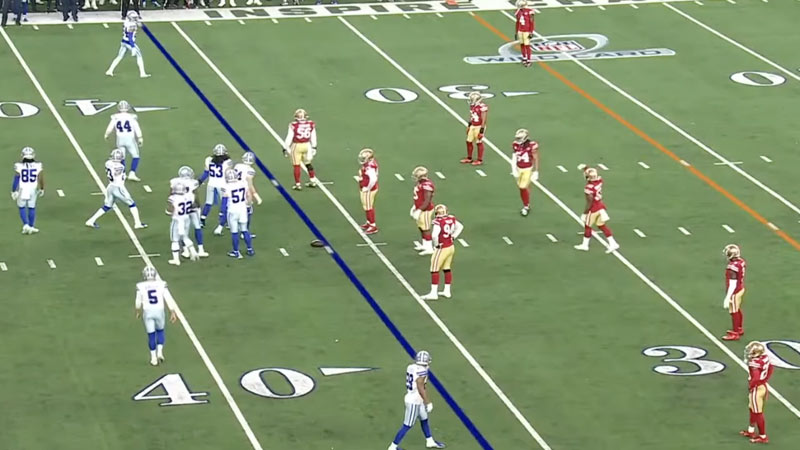
While disconcerting acts in football are generally penalized due to their unsportsmanlike nature and potential to disrupt fair play, some argue that there may be perceived advantages to employing such tactics in specific situations.
It’s important to note that these potential advantages may not necessarily justify or outweigh the negative aspects of disconcerting acts. Nonetheless, here are some points that some might consider as potential advantages:
Psychological Impact
Disconcerting acts can create a psychological advantage by unsettling the offensive players’ focus and confidence. The element of surprise and confusion may cause them to doubt their strategies and hesitate in their execution.
Timing Disruption
Effective disconcerting acts can disrupt the timing and coordination of offensive plays, potentially leading to missed assignments, disrupted routes, and overall offensive inefficiency.
False Starts
By mimicking snap counts or employing other tactics, defensive players can induce offensive linemen to commit false start penalties, resulting in a loss of yardage and potential drive-stalling for the offense.
Disrupted Communication
Disconcerting acts may lead to miscommunication between the quarterback and other offensive players, causing errors in play execution and potentially leading to turnovers.
Strategic Variability
Employing disconcerting acts can add a layer of strategic variability to a defensive game plan. It can force the offense to spend time preparing countermeasures, diverting their focus from other aspects of their strategy.
Game Momentum
Successful disconcerting acts might swing the momentum of the game in favor of the defense. A well-timed disruption could energize the defensive players and impact the overall rhythm of the offense.
Forced Adjustments
The offense may need to adjust their snap count or communication methods to counteract disconcerting acts, potentially leading to changes in their original game plan.
Exploiting Tendencies
Disconcerting acts could be used to exploit offensive tendencies, particularly if the defense has identified specific signals or patterns in the offense’s play-calling.
It’s important to reiterate that while these potential advantages may exist, they are often outweighed by the negative consequences and ethical considerations associated with disconcerting acts.
Drawbacks of Disconcerting Acts
Disconcerting acts in football carry significant drawbacks that undermine fair play and the integrity of the game. These tactics disrupt sportsmanship and competitive balance, leading to detrimental consequences:
Unsportsmanlike Conduct
Disconcerting acts violate the principles of fair competition, promoting a culture of deception rather than skillful play.
Penalties
Such acts incur penalties, resulting in unfavorable field position shifts that impact team strategy and potential scoring opportunities.
Injury Risk
Miscommunication caused by disconcerting acts increases the risk of player collisions, potentially leading to injuries due to unexpected plays.
Game Flow Disruption
These acts disrupt the game’s rhythm, leading to choppy play, decreased excitement, and a slower pace that can frustrate players and fans.
Fan Perception
Engaging in unsportsmanlike behavior alienates fans, tarnishing the sport’s reputation and reducing its appeal.
Strategic Focus Shift
Instead of relying on skill and tactics, teams divert attention to countering disconcerting acts, diminishing strategic depth.
Negative Role Modeling
Such actions set poor examples for young athletes, emphasizing winning at any cost over sportsmanship and respect.
Besides, disconcerting acts detract from the enjoyment of the game, focusing on disruption rather than the teamwork and strategy that make football engaging.
FAQs
What exactly are disconcerting acts in football?
Disconcerting acts involve defensive players mimicking offensive signals, particularly the quarterback’s cadence, to create confusion and disrupt the opposing team’s plays. This includes imitating snap counts, shouting fake audibles, and employing other deceptive tactics.
Why are disconcerting acts penalized?
Disconcerting acts are penalized to maintain the fairness and integrity of the game. Such tactics undermine the principles of sportsmanship, strategic execution, and respectful competition that football upholds.
How are penalties for disconcerting acts enforced?
When referees observe disconcerting acts, they assess a penalty of 15 yards against the offending team. This can impact field position, potentially leading to automatic first downs for the offense.
What are the potential advantages of employing disconcerting acts?
While disconcerting acts may temporarily disrupt the offensive rhythm and induce penalties, they are controversial due to their unsportsmanlike nature. Some argue they could lead to psychological advantages and timing disruptions, but these potential gains come with ethical concerns.
How do disconcerting acts impact the overall game?
Disconcerting acts can alter the game’s flow, cause communication breakdowns, and lead to errors. They also necessitate countermeasures from the offense, diverting attention from other strategic aspects.
Wrapping Up
Football’s disconcerting acts or signals penalty highlights the delicate balance between strategic innovation and ethical gameplay. While these tactics might offer short-term advantages, the long-term consequences of disrupted play, penalties, and a tarnished sportsmanship ethos are undeniable.
The game’s charm lies in fair competition, skillful execution, and teamwork, making it crucial to uphold the principles that define football’s spirit.
As fans and players, our appreciation for the sport thrives when integrity remains at its core. Thank you for your time.

